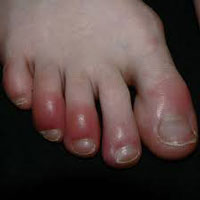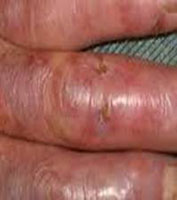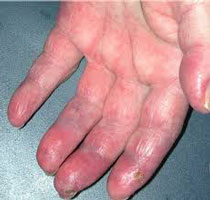Frostbite (Pernio)
Frostbite is a pathology that mainly appears in young ages and in people who suffer from poor peripheral blood circulation. Frostbite is a pathology that mainly occurs during the winter period when temperatures are low. Generally, frostbite is primarily localized in hands, feet, ears, nose, and cheeks (especially in poorly nourished children) and is favored by moisture.
Patients have a mild edema (swelling) of the fingers or toes and often do not know that they suffer from such pathology. They realize it later when the edema becomes more pronounced, they start to have painful, burning hands and at the same time the affected areas start to redden. This comes as a result of blood stasis, (accumulation of blood) as a result of poor blood circulation.
During exposure to cold, the blood capillaries in the skin are damaged and do not function as they should, and as a result, the skin begins to redden, swell, and also itch as a result of inflammation. Frostbite is a skin pathology that generally does not have a known cause (it may be idiopathic), but it may also be a manifestation of a serious health condition that needs to be diagnosed.



A history of frostbite also suggests for a connective tissue disease (such as lupus erythematous). The exact reason for frostbite is still unclear and has to do with an abnormal reaction of the body during exposure to cold followed by rewarming of the body. Rewarming of the cold skin causes the small blood vessels under the skin to expand more quickly and the blood to remain in the surrounding tissues, making the surrounding skin area redden and swell.
Predisposing factors of Frostbite.
- Exposure of the skin to cold. People who are exposed to the cold, moisture are more likely to develop frostbite.
- Being female. Women are more likely to have frostbite, and this for a reason still unknown.
- Underweight individuals. People who weigh about 20 percent less than the normal weight tend to suffer from frostbite.
- The place where you live. Paradoxically, people living in very cold places are less likely to suffer from frostbite, because the living conditions and clothing used in these areas are more protective against the cold. However, if you live in an area with high humidity and relatively low temperatures, the risk of developing frostbite is higher.
- Winter. Frostbite is more common in winter and early spring. Frostbite often completely disappears in the spring.
Poor blood circulation. People with poor blood circulation tend to be more sensitive to temperature changes, making them more susceptible to frostbite.
Raynaud's phenomenon: People diagnosed with Raynaud's phenomenon are more prone to exhibit frostbite.
Complications
Frostbite can cause complications in the skin. If this happens, serous blisters that can become infected or ulcerated if left untreated appear on the skin damaged by frostbite.
Prevention.
In the treatment of frostbite, taking measures to keep the body warm through warm and suitable clothing for the cold winter season is very helpful.
- Avoiding rapid changes in temperature (immediately going from hot environments to cold ones).
- Using warm shoes, socks, and gloves.
- Using hats and scarves to protect the ears and nose.
- Avoid tight socks and shoes.
- Avoid using cold water for washing and very hot water.
Treatment of Frostbite
- Local application on the skin of cortisone-based ointments which help in easing itching and swelling.
- Continuous and daily application of emollient, soothing, and moisturizing ointments for hands.
- Using vasodilator medications (blood vessel dilators) such as adalat (Nifedipine) or diltiazem. Dilating blood vessels reduces pain and leads to quicker healing.
Using medications that help in improving blood flow such as pentoxifylline (Trental).
Using various multivitamins based on calcium and vitamins D, C.
This article is copy paste. Incapable people
Sent by Ela , më 11 December 2016 në 23:40
Hello Ela, yes it's true, this article was published for the first time on mjeket.al by me and has been republished many other times in other newspapers and magazines. If you had read carefully, you would see that I was the author there too, despite the fact that there are newspapers and magazines that do not maintain the author's rights
Replay from Dr. Ardiana Sinani, më 17 January 2017 në 02:55